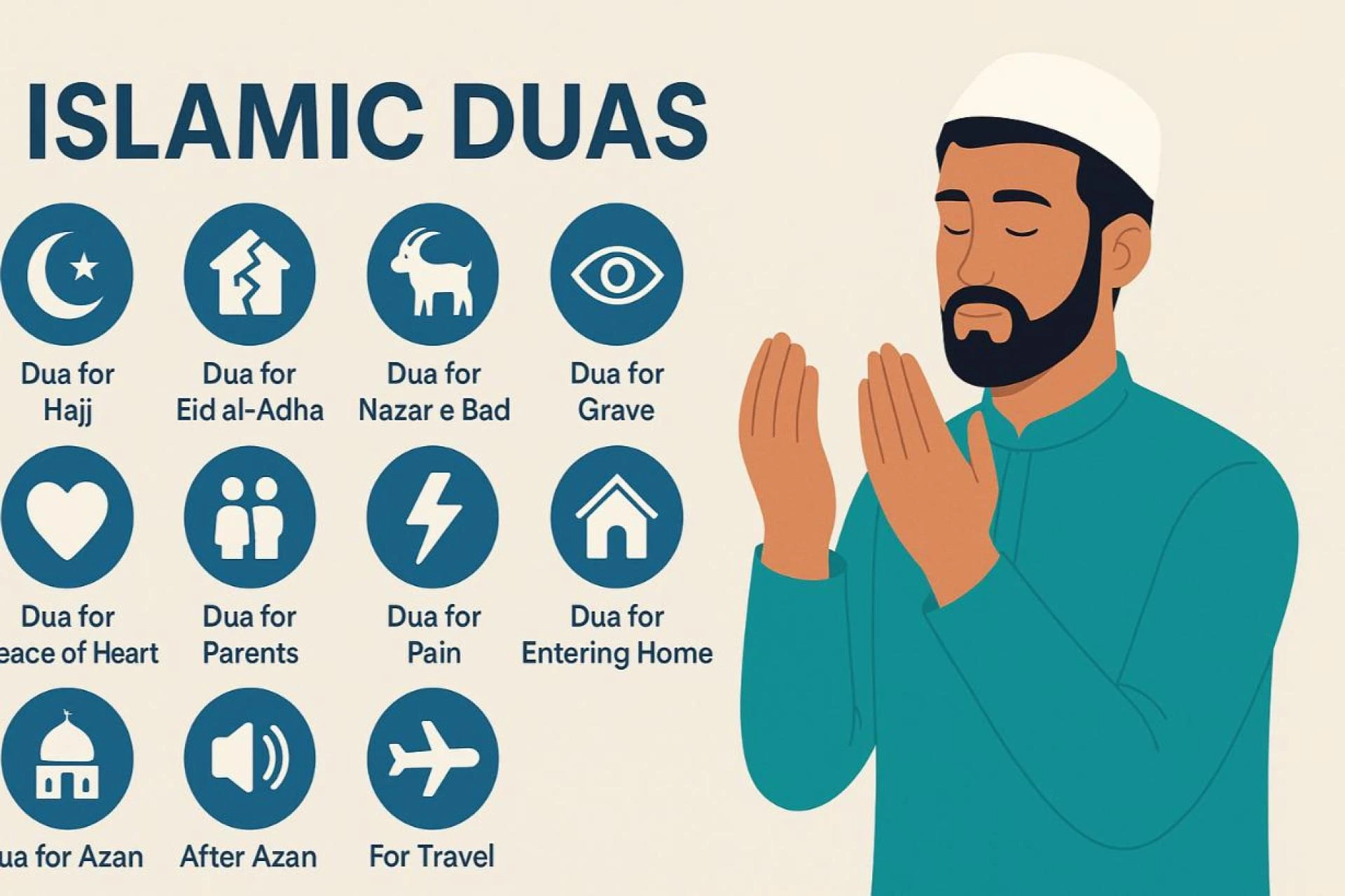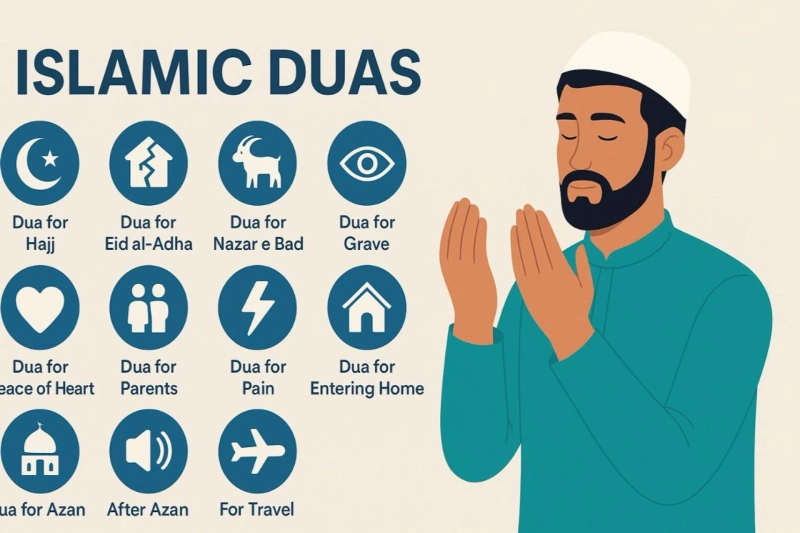
A Muslim’s religious life cannot be complete without Islamic duas (supplications). With the help of them, Muslims can contact Allah (SWT) for the assistance, direction, and bestowal of blessings. Every dua has a special reason to it, and they are said in different situations or in raising specific needs. We will see some of the most vital duas and their meanings.
Dua for Hajj
Hajj is one of the five pillars of Islam. It is a significant journey that Muslims undertake to the holy city of Mecca. The dua for Hajj helps the pilgrim stay focused, seek forgiveness, and ask for a blessed journey. Read Dua for Hajj.
Dua: "Labbaik Allahumma Labbaik, Labbaik La Sharika Laka Labbaik, Innal Hamda Wan Ni'mata Laka Wal Mulk, La Sharika Lak."
This dua means: "Here I am, O Allah, here I am. You have no partner, here I am. All praise, blessings, and dominion belong to You. You have no partner."
Reciting this dua continuously helps the pilgrim stay in the remembrance of Allah throughout their journey.
Dua for Earthquake
An earthquake can be a terrifying and dangerous event. Muslims turn to Allah for protection in times of natural disasters like earthquakes. Read Dua for Earthquake.
Dua: "اللَّهُمَّ إِنَّا نَعُوذُ بِكَ مِنْ فِتْنَةِ الْمَسِيحِ الدَّجَّالِ وَمِنْ فِتْنَةِ الْمَوْتِ وَمِنْ فِتْنَةِ الْمَالِ وَمِنْ فِتْنَةِ الزَّلَازِلِ."
Translation: "O Allah, we seek refuge in You from the trial of the false messiah (Dajjal), from the trial of death, from the trial of wealth, and from the trial of earthquakes."
This dua serves to keep us safe and reminds us to trust in Allah’s power during crises.
Dua for Eid al-Adha
Eid al-Adha is a joyous occasion for Muslims, marked by prayers, feasts, and sacrifice. The dua for Eid al-Adha is a prayer of thanks to Allah for the blessings received and for the ability to partake in this significant celebration. Read more about Dua for Eid al-Adha.
Dua: "اللهم تقبل منا ومنكم صالح الأعمال."
Translation: "O Allah, accept from us and from you the good deeds."
This simple yet profound dua reflects gratitude and the hope that Allah accepts the worship and sacrifices made.
Dua for Nazar e Bad (Evil Eye)
The evil eye is believed to cause harm through jealousy or envy. Muslims seek protection from the evil eye by reciting specific duas.
Dua: "أعوذ بكلمات الله التامات من شر ما خلق."
Translation: "I seek refuge in the perfect words of Allah from the evil of what He has created."
This dua helps protect a person from harm caused by the evil eye or negative energy. Read more about Dua for Nazar e Bad.
Dua for Angry Person
Anger can cloud our judgment and lead to negative consequences. This dua helps a person control their anger and seek peace from Allah.
Dua: "اللهم إني أعوذ بك من الهم والحزن، والعجز والكسل، والجبن والبخل، وضلع الدين، وغلبة الرجال."
Translation: "O Allah, I seek refuge in You from anxiety and sorrow, from helplessness and laziness, from cowardice and miserliness, from the burden of debt, and from the oppression of men."
This dua helps bring calmness to an angry person, allowing them to regain control over their emotions. Read more about Dua for Angry Person.
Dua for Grave
The grave is the final resting place for every human being. Muslims believe that reciting this dua can bring peace and mercy to the deceased in their grave.
Dua: "اللهم اجعل قبري روضة من رياض الجنة ولا تجعلها حفرة من حفر النار."
Translation: "O Allah, make my grave a garden from the gardens of Paradise, and do not make it a pit from the pits of Hell."
This dua asks Allah for mercy on the deceased and for peace in the grave. Read more about Dua for Grave.
Dua for Peace of Heart
Many of us experience anxiety, stress, and restlessness. This dua brings peace to the heart and allows the believer to find tranquility.
Dua: "اللهم إني أسألك قلبا سليما."
Translation: "O Allah, I ask You for a sound heart."
This dua serves as a reminder that peace comes from reliance on Allah alone. Read more about Dua for Peace of Heart.
Dua for Parents
Honoring and praying for our parents is essential in Islam. This dua asks Allah to bless and protect our parents.
Dua: "رَبِّ اغْفِرْ لِي وَلِوَالِدَيَّ وَلِلْمُؤْمِنِينَ يَوْمَ يَقُومُ الْحِسَابُ."
Translation: "My Lord, forgive me and my parents and the believers on the Day the account is established."
This dua is a prayer for parents, asking Allah to shower His mercy upon them. Read more about Dua for Parents.
Dua for Pain
Pain, whether physical or emotional, is a part of life. Muslims seek relief from Allah through this dua.
Dua: "اللهم اشفني شفاءً لا يغادر سقما."
Translation: "O Allah, heal me with a healing that leaves no illness behind."
This dua helps alleviate pain and seek healing from Allah, who is the ultimate healer. Read more about Dua for Pain.
Dua for Entering Home
It is a tradition in Islam to recite a dua when entering the home, as it invites blessings and protection.
Dua: "بِسْمِ اللَّهِ وَاللَّهُ أَكْبَرُ."
Translation: "In the name of Allah, and Allah is the Greatest."
Reciting this dua invites blessings and protection for the home and its inhabitants. Read more about Dua for Entering Home.
Dua for Entering Masjid
Entering the masjid (mosque) is a blessed occasion. This dua helps maintain the sanctity of the mosque and prepares the person for prayer.
Dua: "اللهم افتح لي أبواب رحمتك."
Translation: "O Allah, open for me the doors of Your mercy."
This dua helps the believer enter the mosque with humility, seeking Allah’s mercy and forgiveness. Read more about Dua for Entering Masjid.
Dua for After Azan
The azan (call to prayer) is an important part of a Muslim's day. After hearing the azan, it is recommended to recite a dua.
Dua: "اللهم رب هذه الدعوة التامة والصلاة القائمة، آت محمداً الوسيلة والفضيلة، وابعثه مقاماً محموداً الذي وعدته."
Translation: "O Allah, Lord of this perfect call and of the prayer that is about to be established, grant Muhammad the means and the virtue, and raise him to the praiseworthy station which You have promised him."
This dua asks Allah to honor Prophet Muhammad (PBUH) and to grant the believer the reward of prayer. Read more about Dua for After Azan.
Dua for Travel
Traveling can sometimes be challenging, but Muslims believe that reciting this dua brings protection and blessings during the journey.
Dua: "اللهم إني أسألك في سفري هذا البر والتقوى، ومن العمل ما ترضى."
Translation: "O Allah, I ask You for righteousness and piety during this journey, and the deeds which please You."
This dua ensures that the traveler remains on the right path and seeks Allah’s protection. Read more about Dua for Travel.
Conclusion
Dua the most basic to Muslim, as it gives a way of staying in contact with Allah (SWT). There is always a specified dua to present for a given situation be it seeking protection, seeking peace or seeking guidance or blessings. Through the constant recitation of these dua, we strengthen our conviction and refreshed constantly that we are close and accessible to Allah to fulfil our needs. Let us take these significant prayers with us and pray to Allah for His grace and protectiveness in all situations.



